
Anti Aging Supplements you Need to Include in Your Daily Routine


Anti Aging Supplements you Need to Include in Your Daily Routine
You can’t stop time, but you can slow down how your body ages with your diet, lifestyle, anti-aging supplements, and biohacks.
Why Do We Age?
There are many theories that explain why we age. One of them is that our body, cells, and genetic materials have accumulated damage while losing their ability to self-repair. These damages may arise from oxidative stress and reduced antioxidant capacity.
Think of oxidation like a rusting process on metal or when apples brown when you leave them out and are exposed to air. Similarly, oxidation can break down your cells and throw off cellular processes, especially mitochondrial function. Inside your body, there are antioxidant molecules that prevent excessive oxidation. When you have too many oxidative molecules relative to antioxidants, you have oxidative stress.
Excess oxidative stress can result in chronic inflammation. Oxidative stress and inflammation can:
- Separate and disrupt collagen fibers, which may cause thin and sagging skin
- Cell, protein, and DNA damage, which contributes to aging and loss of function
- Contribute to age-related health conditions and diseases

The hallmarks of aging include:
- Genomic instability is when your DNA becomes more likely to sustain breaks or mutations because your cells have less capacity to repair damaged DNA. Exposure to toxicity and oxidative stress can also destabilize your DNA.
- Telomere attrition. The telomeres are the protective ends of your chromosomes that shorten every cell division. At a certain age, you’ve had enough cell divisions that the telomeres become too short, causing cells to age and stop working properly.
- Epigenetic alterations. Aging is associated with epigenetic changes that turn off anti-aging genes and turn on cellular aging genes. These epigenetic or “above gene” changes don’t change the DNA sequence, but do affect how active the genes are.
- Loss of proteostasis. In order for your cells to work well, your proteins have to be able to fold and take their functional shapes, so your cells have proteins that can help with correct protein folding. When the protein folding machineries fail, your cells can accumulate misfolded proteins, causing them to age.
- Deregulated nutrient-sensing. Nutrient sensing pathways such as mTOR, insulin signaling, Sirtuins, and AMPK ensure that the cells appropriately use nutrients for cellular reconstruction or restoration. When these pathways don’t work appropriately, it can lead to accelerated aging.
- Mitochondrial dysfunction. Your mitochondria produce energy for your cells. It also helps detect dangers and tell damaged cells to commit suicide (apoptosis). Mitochondrial dysfunction contributes to aging due to low energy production, chronic inflammation, and potential cancer growth due to lack of apoptosis.
- Cellular senescence is when cells cannot divide due to telomere shortening and other accumulated damage. These aged cells do not die off either, but they accumulate as we age
- Stem cell exhaustion. Your stem cells are the cells that can divide and become different types of cells, so they can help regenerate and repair damaged tissues. But as you age, you can run out of these stem cells, so your wounds, injuries, and damaged skin don’t heal as well.
- Altered intercellular communication. Cells communicate with one another either by direct contact or by releasing signaling molecules, such as hormones, neurotransmitters, and cytokines. Aging features can interfere with these communication signals.
These processes happen for everyone over time as you progress towards death. However, anti-aging refers to not only delaying death, but also to be as healthy and functional as possible for as long as possible. You want to maximize healthspan as well, not just lifespan.
How To Age Gracefully And Maximize Your Healthspan
Aging isn’t just looking old. Many people associate aging with developing aches and pains, along with age-related diseases, such as diabetes, dementia, osteoarthritis, high blood pressure, cancer, and more.
While hallmarks of aging contribute to the diseases of aging, it doesn’t mean you are fated to suffer from these. The right diet, lifestyle, supplements, and biohacks can help you age gracefully and live in great health into old age.
Use Sun Protection
Sun exposure, especially when it involves physical activity outside, can be very healthy and antiaging. However, UV exposure can also age your skin.
A study looked into whether using sunscreen and consuming antioxidants on a regular basis could help prevent skin aging. 903 adults under the age of 55 were randomly assigned to one of four groups: daily use of sunscreen with 30 mg of β-carotene, daily use of sunscreen with placebo, irregular use of sunscreen with 30 mg of β-carotene, and irregular use of sunscreen with placebo.
Participants had to be under the age of 55 because photoaging, rather than growing old, is the primary cause of skin aging in this age group. The study found that using sunscreen on a regular basis protects against photoaging, which is the wrinkling, spotting, and loss of elasticity caused by exposure to the sun’s ultraviolet radiation. However, β-carotene supplementation had no effect on skin aging.

Get Physically Active
Your lean muscle mass and strength determine your quality of life, especially as you get older. Aging is associated with muscle loss. Also, if you’re training, muscles grow more slowly, and you may take more time to get the same fitness progress when you’re older, but it is possible to build muscle mass regardless of your age and gender.
You can also improve your lifespan and health by combining resistance training with proper nutrition. The minimum effective dose is for 20 to 30 minutes per session three times per week.
Endurance and high-intensity interval training (HIIT) are also great to add to your routine because they keep your heart rate up and lengthen your telomeres, allowing your cells to divide for longer. As we know by now, telomeres shrink as we age. HIIT also boosts growth hormone and insulin growth factor.
This study featured 124 healthy, previously inactive non-smokers between the ages of 30 and 60. The participants split into four groups: the aerobic group (constant running), the HIIT group (4×4 interval program), the resistance group (machine exercises), and the control group (no exercise at all). The study lasted 26 weeks, and in the end, the control and resistance groups had no change in telomere length, but the aerobic and HIIT groups had an increase in their length.
Exercise can help balance blood sugar by promoting muscle insulin sensitivity, which is important for blood sugar control and insulin sensitivity. Having more muscle mass helps improve blood sugar control, so start exercising now. Incorporate resistance training in order to build muscle.
A kick for your health performance kapex supplement; a supplement designed to support a keto diet. It improves keto, low-carb, and paleo digestion.
Kapex increases AMPK, an enzyme that promotes energy production, and stimulates mitochondrial function.

Get Enough High-Quality Sleep
Lack of sleep and poor quality sleep can age your body and appearance by:
- Increasing oxidative stress and inflammation
- Creating wrinkles and fine lines, hanging eyelids, and droopy mouth corners
- Causing swollen, red eyes, and dark under eye circles
- Accelerating age-related cognitive decline
- Impairing blood sugar control
Sleep is also important for waste removal from the brain, so lack of sleep may increase waste such as beta-amyloid in your brain. Beta-amyloid is a protein in the brain related to age-related cognitive impairment and Alzheimer’s disease. rance by
Poor sleep also increases oxidative stress, throws off hormones, and causes insulin resistance. Therefore you should always aim for at least 7 hours of your well-deserved anti-aging sleep.
Balance And Stabilize Blood Sugar
Unstable blood sugar fluctuates between low and high blood sugar levels, which can drive insulin resistance and high oxidative stress. These can drive many aging processes in the body.
Causes of unstable blood sugar may include:
- High-carb or sugar meals
- Dehydration
- Lack of physical activity
- Stress
- Side effects from medications
- Short-term (acute) or long-term (chronic) pain
- Insufficient insulin or insulin resistance
- Hormonal changes (due to stress, illness, or menstruation)
Read the article on maintaining stable blood sugar levels if this is something that you find yourself struggling with.
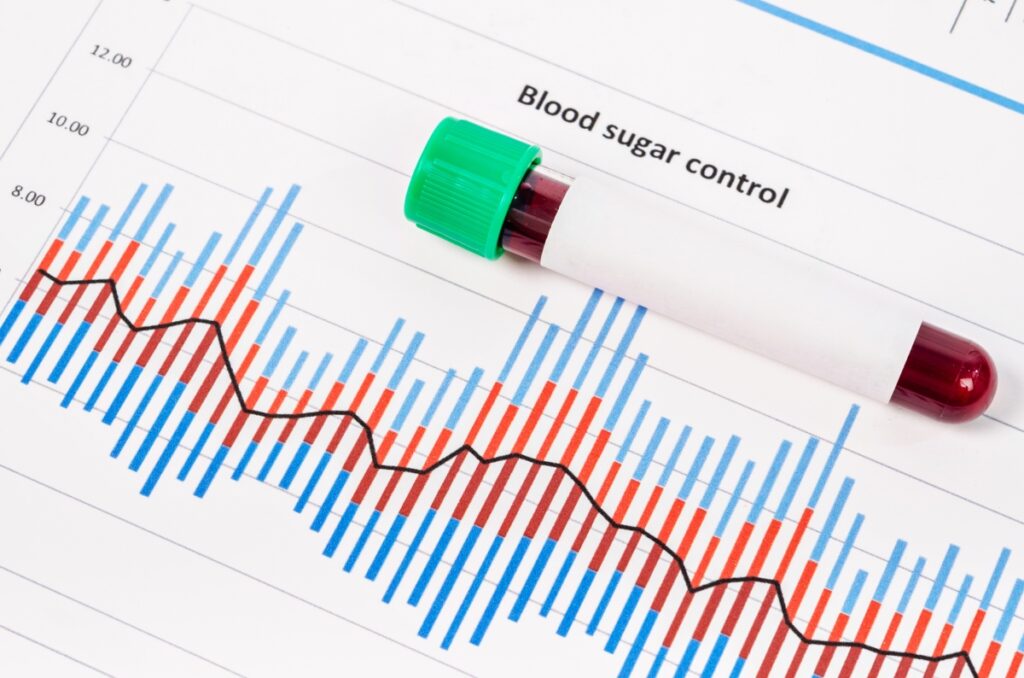
Anti-Aging Supplements To Consider
Curcumin
Curcumin is the active ingredient in turmeric. Curcumin increases the level/activity of some anti-aging proteins like sirtuins and AMP-activated kinase (AMPK) while inhibiting pro-aging proteins, such as NF-κB (the central controller of inflammatory pathways) and mammalian target of rapamycin (mTOR).
Curcumin’s way of action lies in slowing aging down by protecting cells from damage and activating proteins that postpone cellular senescence.
Collagen
Collagen is a protein that maintains skin structure and elasticity. As you age, your collagen production goes down, resulting in aging signs like wrinkles. Collagen supplements come in the form of hydrolyzed collagen peptides or gelatin and its supplementation may help reduce the signs of aging.
A study of 72 women aged 35 and up with healthy skin of any type found that taking a supplement containing 2.5 grams of collagen as well as vitamin C, zinc, biotin, and vitamin E improved their skin. 36 women each are in two different groups—the test group and the placebo group.
For 12 weeks, the women took either the supplement or the placebo. The results of the study show that the supplement group drastically enhanced skin hydration, elasticity, roughness, and density when compared to the placebo group.
As a result, collagen supplements may improve skin elasticity, wrinkle reduction, skin hydration, and even nail growth.
Discover this amazing blend of mushrooms and collagen. Mushroom Breakthrough is a blend of four mushrooms and collagen that gives you maximum brain power, a stronger immune system, and healthier skin, hair, and nails.
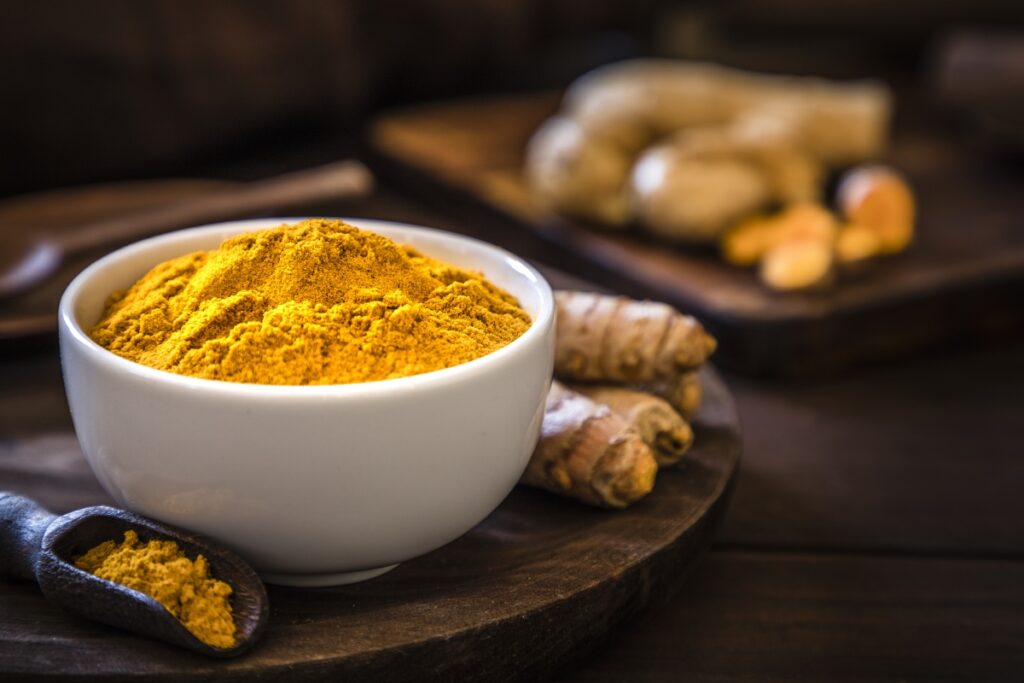
Vitamin C
In your body, vitamin C acts as an antioxidant, protecting cells from oxidative damage. It is also involved in immune function, inflammation regulation, and many other processes related to healthy aging.
We all know we should take vitamin C, and when it comes to its role in the immune system, vitamin C helps strengthen the immune system by producing more immune cells. When it comes to skin, it protects the skin from oxidative stress and prevents premature aging.
So, vitamin C supplementation may improve skin hydration, stimulate collagen production, and slow down wrinkle progression and premature aging caused by sun exposure. You can take Vitamin C from food or as a supplement. An adult’s daily recommended amount is 65 to 90 milligrams.
Vitamin E
Vitamin E is a fat-soluble vitamin that can help with wrinkles, dark spots, and skin elasticity. Vitamin E is necessary not only for immune function and inflammation regulation but also for maintaining health as we age.
Resveratrol
Resveratrol, a strong sirtuin-activating polyphenol antioxidant found in grapes, berries, peanuts, and red wine, is well-known for its anti-aging properties. With its antioxidant properties, it neutralizes free radicals that harm our skin. Sirtuins are enzymes that regulate many cellular functions. Low sirtuin function also contributes to poor blood sugar and metabolic control, along with age-related cognitive decline.
Resveratrol comes in forms of dietary supplements and skin care products. A great way to incorporate resveratrol is in your night-time skin care routine as it is light-sensitive.
Selenium
Selenium is an antioxidant mineral. Selenium can also help to reduce oxidative stress by neutralizing free radicals in the body.
Great sources of selenium are:
- Brazil nuts
- Tuna
- Sardines
- Shrimp
- Roasted ham
- Macaroni
- Turkey
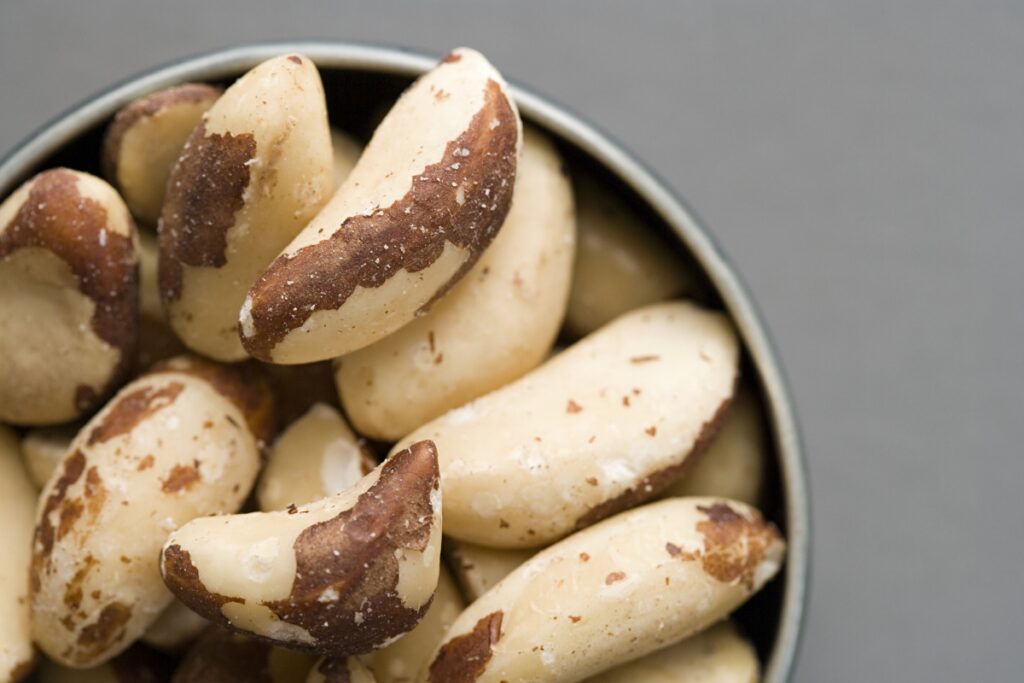
CoQ10
Coenzyme Q10 (CoQ10) is a cofactor for the mitochondria energy production. It is necessary for energy production, protects cells from damage, and promotes the production of collagen. CoQ10 supplementation seems to boost mitochondria function.
A 48-month study investigated the impact of supplementation with selenium and CoQ10 in elderly people. 443 elderly people participated in the study, where 221 participants received the supplement with CoQ10 and selenium and 222 participants received the placebo.
Participants who took the supplement improved their health, had fewer hospital visits, and slowed down physical signs of aging and mental deterioration. CoQ10 supplements may work by counteracting oxidative stress, promoting heart health, and supporting healthy energy production.
Probiotics
Probiotics, also known as good microbes, may aid digestion and allow your body to harvest nutrients from food better. They may help control harmful microbes and improve nutrient absorption. You can find probiotics in fermented foods and cultured milk, but probiotic supplements are also available.
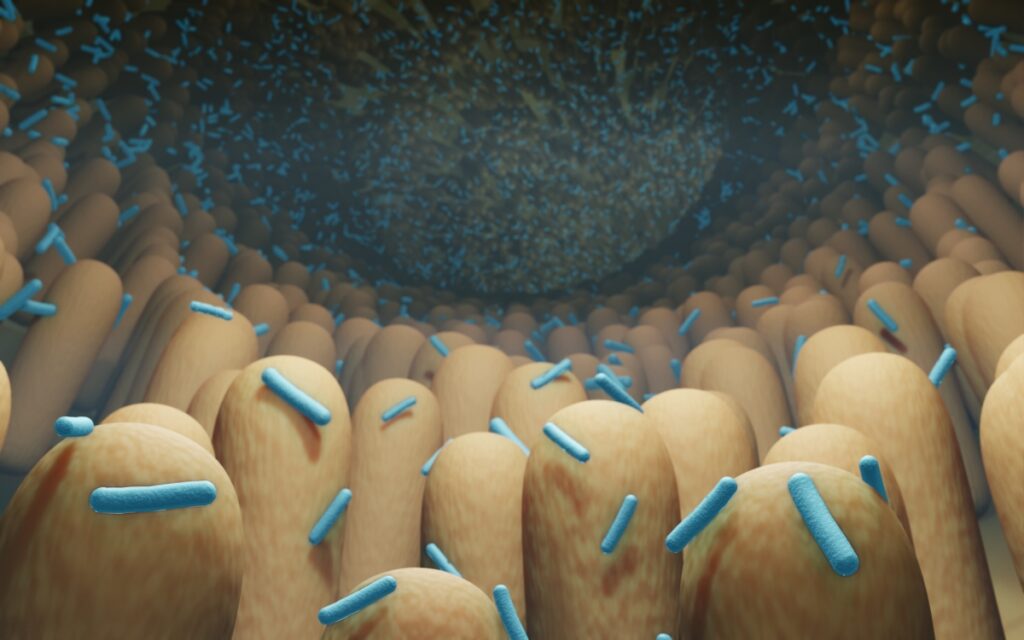
Aging is associated with declining digestive enzyme production, nutrient assimilation, and overall digestive health. Supporting your gut flora with probiotics and fermented foods can help mitigate this decline.
Probiotic supplements can increase beneficial gut bacteria that produce postbiotics, including short-chain fatty acids (SCFAs) such as acetate, propionate, and butyrate. This help maintain healthy gut function. They also support healthy mitochondria function.
Achieve optimal health with the best probiotic for gut health.
Digestive Enzymes And Stomach Acid
Elderly people can develop low appetite and nutrient deficiencies due to low enzymes and stomach acid. This is where digestive enzymes and betaine HCL can help support healthy digestion and nutrient assimilation.
Gastric juice is a digestive fluid that contains stomach acid and digestive enzymes. Stomach acid digests food and kills pathogenic bacteria. Aging is one of the reasons why the stomach may not produce enough acid. To maintain stomach acidity and ensure nutrient absorption from food, consider introducing a betaine HCL supplement.
Magnesium
Magnesium is responsible for over 300 biochemical reactions in your body. It’s important for metabolism, blood sugar balance, immune function, mitochondrial energy production, and more.
Magnesium deficiency is frequently associated with aging. In healthy people, magnesium concentrations remain constant throughout life, but it eventually decreases with age. Magnesium diet deficiency is common in the elderly. Common causes of Mg deficiency in the elderly include:
- Decreased magnesium intestinal absorption
- Decreased magnesium bone stores
- Excessive excretion in the urine
- Conditions and diseases, such as insulin resistance and/or type 2 diabetes mellitus
- Medications (hypermagnesuric diuretics).
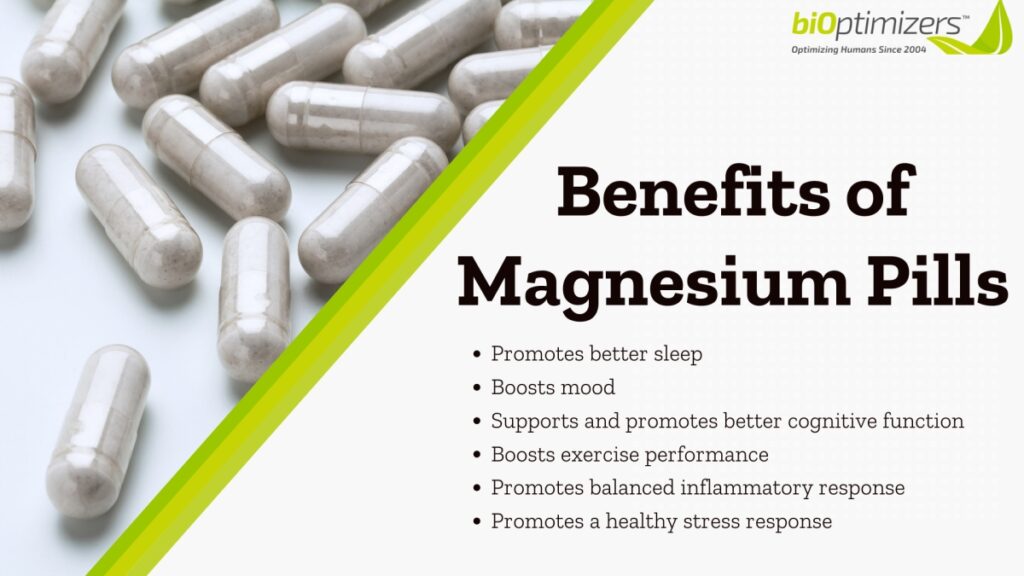
When your body produces insulin, but your cells cannot respond to it effectively, this is referred to as insulin resistance. Poor blood sugar control can cause the kidneys to excrete more magnesium in the urine, which makes magnesium deficiency worse.
Inflammatory and oxidative stress is often related to low magnesium levels, which in turn accelerates aging.
Both chronic inflammation and oxidative stress are leading factors in aging and age-related diseases. Magnesium deficiency makes your skin far more vulnerable to harmful free radical damage, which can eventually lead to wrinkling and skin damage.
Magnesium supplementation may be a simple and low-cost solution to healthier aging and the prevention of age-related issues. Work with your healthcare provider to determine how much you should take to correct any deficiency. Read more to find out if 500 mg of magnesium is too much.
Conclusion
Fine lines and wrinkles, sagging skin, age spots, and annoying gray hairs are the first signs of aging that you may notice. Aging, however, is more than just looking old. Many tend to associate aging with the development of aches and pains as well as age-related diseases.
It is never too early or too late to work on slowing down the aging process. Essentially a healthy lifestyle—getting physically active and following a balanced diet and anti-aging supplements– can help slow aging down. It’s not all about looking good, it’s about feeling good and living your maximum healthspan.
References
- Liguori I, Russo G, Curcio F, et al. Oxidative stress, aging, and diseases. Clin Interv Aging. 2018;13:757-772. doi:10.2147/cia.s158513
- Kruk J, Duchnik E. Oxidative stress and skin diseases: possible role of physical activity. Asian Pac J Cancer Prev. 2014;15(2):561-568. doi:10.7314/apjcp.2014.15.2.561
- López-Otín C, Blasco MA, Partridge L, Serrano M, Kroemer G. The hallmarks of aging. Cell. 2013;153(6):1194-1217. doi:10.1016/j.cell.2013.05.039
- Hughes MCB, Williams GM, Baker P, Green AC. Sunscreen and prevention of skin aging: a randomized trial: A randomized trial. Ann Intern Med. 2013;158(11):781-790. doi:10.7326/0003-4819-158-11-201306040-00002
- Gallant M, Lightheart W, Asprey D. From Sick to Superhuman: The Ultimate Biological Optimization Blueprint: Optimize Your Health and Lifespan, Get the Body You Have Always Wanted, Experience Peak Mental and Physical Performance. BiOptimizers; 2021.
- Werner CM, Hecksteden A, Morsch A, et al. Differential effects of endurance, interval, and resistance training on telomerase activity and telomere length in a randomized, controlled study. Eur Heart J. 2019;40(1):34-46. doi:10.1093/eurheartj/ehy585
- Herbert P, Hayes LD, Sculthorpe N, Grace FM. High-intensity interval training (HIIT) increases insulin-like growth factor-I (IGF-I) in sedentary aging men but not masters’ athletes: an observational study. Aging Male. 2017;20(1):54-59. doi:10.1080/13685538.2016.1260108
- Suh SH, Paik IY, Jacobs K. Regulation of blood glucose homeostasis during prolonged exercise. Mol Cells. 2007;23(3):272-279. Accessed April 21, 2022. https://pubmed.ncbi.nlm.nih.gov/17646701/
- Lee J, Kim D, Kim C. Resistance training for glycemic control, muscular strength, and lean body mass in old type 2 diabetic patients: A meta-analysis. Diabetes Ther. 2017;8(3):459-473. doi:10.1007/s13300-017-0258-3
- Sundelin T, Lekander M, Kecklund G, Van Someren EJW, Olsson A, Axelsson J. Cues of fatigue: effects of sleep deprivation on facial appearance. Sleep. 2013;36(9):1355-1360. doi:10.5665/sleep.2964
- Sleep deprivation increases Alzheimer’s protein. National Institutes of Health (NIH). Published April 23, 2018. Accessed April 21, 2022. https://www.nih.gov/news-events/nih-research-matters/sleep-deprivation-increases-alzheimers-protein
- Gopalakrishnan A, Ji LL, Cirelli C. Sleep deprivation and cellular responses to oxidative stress. Sleep. 2004;27(1):27-35. doi:10.1093/sleep/27.1.27
- Leproult R, Van Cauter E. Role of sleep and sleep loss in hormonal release and metabolism. Endocr Dev. 2010;17:11-21. doi:10.1159/000262524
- Mesarwi O, Polak J, Jun J, Polotsky VY. Sleep disorders and the development of insulin resistance and obesity. Endocrinol Metab Clin North Am. 2013;42(3):617-634. doi:10.1016/j.ecl.2013.05.001
- Watson NF, Badr MS, Belenky G, et al. Recommended amount of sleep for a healthy adult: A joint consensus statement of the American Academy of Sleep Medicine and Sleep Research Society. Sleep. 2015;38(6):843-844. doi:10.5665/sleep.4716
- Zakerkish M, Jenabi M, Zaeemzadeh N, Hemmati AA, Neisi N. The effect of Iranian Propolis on glucose metabolism, lipid profile, insulin resistance, renal function and inflammatory biomarkers in patients with type 2 diabetes mellitus: A randomized double-blind clinical trial. Sci Rep. 2019;9(1):7289. doi:10.1038/s41598-019-43838-8
- Good to know: Factors affecting blood glucose. Clin Diabetes. 2018;36(2):202. doi:10.2337/cd18-0012
- Bielak-Zmijewska A, Grabowska W, Ciolko A, et al. The role of curcumin in the modulation of ageing. Int J Mol Sci. 2019;20(5):1239. doi:10.3390/ijms20051239
- Lee SH, Lee JH, Lee HY, Min KJ. Sirtuin signaling in cellular senescence and aging. BMB Rep. 2019;52(1):24-34. doi:10.5483/bmbrep.2019.52.1.290
- Lupu MA, Gradisteanu Pircalabioru G, Chifiriuc MC, Albulescu R, Tanase C. Beneficial effects of food supplements based on hydrolyzed collagen for skin care (Review). Exp Ther Med. 2020;20(1):12-17. doi:10.3892/etm.2019.8342
- Bolke L, Schlippe G, Gerß J, Voss W. A collagen supplement improves skin hydration, elasticity, roughness, and density: Results of a randomized, placebo-controlled, blind study. Nutrients. 2019;11(10):2494. doi:10.3390/nu11102494
- Vitamin C. Nih.gov. Accessed April 21, 2022. https://ods.od.nih.gov/factsheets/VitaminC-HealthProfessional/
- Carr A, Maggini S. Vitamin C and immune function. Nutrients. 2017;9(11):1211. doi:10.3390/nu9111211
- Pullar J, Carr A, Vissers M. The roles of vitamin C in skin health. Nutrients. 2017;9(8):866. doi:10.3390/nu9080866
- Michalak M, Pierzak M, Kręcisz B, Suliga E. Bioactive compounds for skin health: A review. Nutrients. 2021;13(1):203. doi:10.3390/nu13010203
- Meydani SN, Lewis ED, Wu D. Perspective: Should vitamin E recommendations for older adults be increased? Adv Nutr. 2018;9(5):533-543. doi:10.1093/advances/nmy035
- Li J, Zhang CX, Liu YM, Chen KL, Chen G. A comparative study of anti-aging properties and mechanism: resveratrol and caloric restriction. Oncotarget. 2017;8(39):65717-65729. doi:10.18632/oncotarget.20084
- Mohar DS, Malik S. The Sirtuin system: The holy grail of Resveratrol? J Clin Exp Cardiolog. 2012;3(11). doi:10.4172/2155-9880.1000216
- Chalkiadaki A, Guarente L. The multifaceted functions of sirtuins in cancer. Nat Rev Cancer. 2015;15(10):608-624. doi:10.1038/nrc3985
- Zhu XD, Lei XP, Dong WB. Resveratrol as a potential therapeutic drug for respiratory system diseases. Drug Des Devel Ther. 2017;11:3591-3598. doi:10.2147/DDDT.S148868
- Schnabel R, Lubos E, Messow CM, et al. Selenium supplementation improves antioxidant capacity in vitro and in vivo in patients with coronary artery disease The SElenium Therapy in Coronary Artery disease Patients (SETCAP) Study. Am Heart J. 2008;156(6):1201.e1-11. doi:10.1016/j.ahj.2008.09.004
- Selenium. Nih.gov. Accessed April 21, 2022. https://ods.od.nih.gov/factsheets/Selenium-HealthProfessional/
- Hernández-Camacho JD, Bernier M, López-Lluch G, Navas P. Coenzyme Q10 supplementation in aging and disease. Front Physiol. 2018;9:44. doi:10.3389/fphys.2018.00044
- Johansson P, Dahlström Ö, Dahlström U, Alehagen U. Improved health-related quality of life, and more days out of hospital with supplementation with selenium and coenzyme Q10 combined. Results from a double blind, placebo-controlled prospective study. J Nutr Health Aging. 2015;19(9):870-877. doi:10.1007/s12603-015-0509-9
- Pizzino G, Irrera N, Cucinotta M, et al. Oxidative stress: Harms and benefits for human health. Oxid Med Cell Longev. 2017;2017:1-13. doi:10.1155/2017/8416763
- Kechagia M, Basoulis D, Konstantopoulou S, et al. Health benefits of probiotics: a review. ISRN Nutr. 2013;2013:481651. doi:10.5402/2013/481651
- Judkins TC, Archer DL, Kramer DC, Solch RJ. Probiotics, nutrition, and the small intestine. Curr Gastroenterol Rep. 2020;22(1):2. doi:10.1007/s11894-019-0740-3
- Parada Venegas D, De la Fuente MK, Landskron G, et al. Short chain fatty acids (SCFAs)-mediated gut epithelial and immune regulation and its relevance for Inflammatory Bowel Diseases. Front Immunol. 2019;10:277. doi:10.3389/fimmu.2019.00277
- Markowiak-Kopeć P, Śliżewska K. The effect of probiotics on the production of short-chain fatty acids by human intestinal microbiome. Nutrients. 2020;12(4):1107. doi:10.3390/nu12041107
- Ianiro G, Pecere S, Giorgio V, Gasbarrini A, Cammarota G. Digestive enzyme supplementation in gastrointestinal diseases. Curr Drug Metab. 2016;17(2):187-193. doi:10.2174/138920021702160114150137
- Ramsay PT, Carr A. Gastric acid and digestive physiology. Surg Clin North Am. 2011;91(5):977-982. doi:10.1016/j.suc.2011.06.010
- Barbagallo M, Belvedere M, Dominguez LJ. Magnesium homeostasis and aging. Magnes Res. 2009;22(4):235-246. doi:10.1684/mrh.2009.0187
- Killilea DW, Maier JAM. A connection between magnesium deficiency and aging: new insights from cellular studies. Magnes Res. 2008;21(2):77-82.
- Barbagallo M, Dominguez LJ. Magnesium and type 2 diabetes. World J Diabetes. 2015;6(10):1152-1157. doi:10.4239/wjd.v6.i10.1152
- Cahill F, Shahidi M, Shea J, et al. High dietary magnesium intake is associated with low insulin resistance in the Newfoundland population. PLoS One. 2013;8(3):e58278. doi:10.1371/journal.pone.0058278
- Nielsen FH. Magnesium deficiency and increased inflammation: current perspectives. J Inflamm Res. 2018;11:25-34. doi:10.2147/JIR.S136742
- Furman D, Campisi J, Verdin E, et al. Chronic inflammation in the etiology of disease across the life span. Nat Med. 2019;25(12):1822-1832. doi:10.1038/s41591-019-0675-0
- Barbagallo M, Dominguez LJ. Magnesium and aging. Curr Pharm Des. 2010;16(7):832-839. doi:10.2174/138161210790883679
